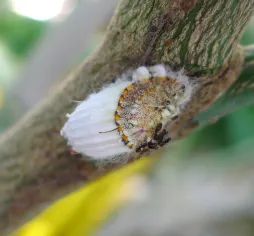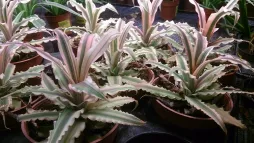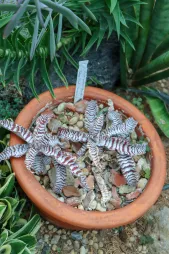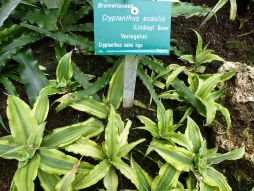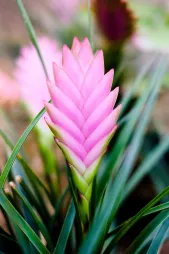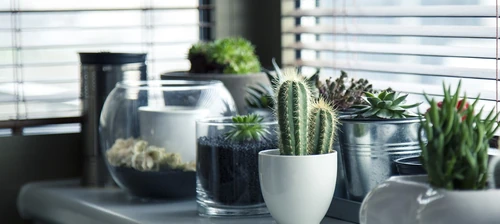Cryptanthus bivittatus, the double-striped cryptanthus that hides its flowers well
Cryptanthus bivittatus, also known as double-striped cryptanthus, is a species belonging to the Bromeliaceae family. Native to the forests of eastern Brazil, this dwarf perennial hides its flowers under zebra foliage.
How to recognize Cryptanthus bivittatus or double-striped cryptanthus?
Double-striped Cryptanthus is distinguished by its bushy, flattened habit. Its structure forms a flared rosette around 15 centimetres in diameter. A slow-growing, hardy perennial, it generally reaches a height of 10 to 20 centimetres. It has an equivalent spread.
Its sparsely-developed roots are adapted to its forest habitat. Each leaf emerges directly from the base to form a star-shaped rosette.
Its evergreen, wavy, serrated foliage offers a palette of colors ranging from pale to bright green. The linear-lanceolate leaves feature double longitudinal lines of dark green, reddish or pink. The underside has silvery-white scales.
As with its cultivar, cryptanthus 'Pink Starlite, tiny white flowers with three petals appear in the center of the rosette. The anthers at the end of the stamen are creamy white, while the calyx is a coppery bronze. After flowering, Cryptanthus bivittatus dies. Its rosette gradually withers and it produces shoots in order to reproduce.
Cryptanthus bivittatus is not known to be toxic to humans. Take precautions with your pets, however, as it can be irritating when ingested in large quantities.
Our maintenance tips
Cryptanthus bivittatus are slow-growing. Often, one repotting after purchase or when taking cuttings is enough for their entire life. You can, however, repot the mother plant after flowering to give the offshoots room to develop.
Watering
Cryptanthus bivittatus like to keep soil moist, but not soggy. Water when the soil surface is dry (two to three centimetres).
Water the substrate with non-calcareous water, such as rainwater, at room temperature.
Allow the water to drain through the drainage holes before replacing the plant. Empty out any water stagnating in the saucer or planter. It may rot the roots.
Spray
Brumisez le feuillage avec une eau non calcaire améliore l'hygrométrie et lutte contre les attaques de nuisibles.
Repotting
Every spring, repot your Cryptanthus bivittatus to give it more space.
Cryptanthus bivittatus like light, acidic soil. To meet their needs, it's best to create your own substrate by mixing equal parts sphagnum moss, sand and heather soil.
Get a pot with a ten-centimeter diameter hole and fill it with your mixture. Water generously.
Plant your Cryptanthus bivittatus in the center. Pack gently.
In summer, you can place your pot on a dish of moist clay balls to increase humidity.
Fertilization
Add a special Bromeliad foliar fertilizer to the water when misting. Follow the dosage instructions to avoid damaging the foliage.
Prune
To encourage the growth of your Cryptanthus bivittatus, prune regularly.
Remove dead leaves. If you use pruning shears or scissors, clean them beforehand to prevent the spread of disease.
Cutting
Wait until the end of flowering to propagate your Cryptanthus bivittatus.
Wait until the shoots are at least a third of the size of the main plant before removing them. Separate them with your hands or a clean, sharp instrument (pruning shears or scissors). Be sure to keep some roots for each cutting.
Fill a perforated pot about ten centimetres in diameter with a mixture of peat (50%) and sand (50%). You can also use the same substrate as for an adult plant, mixing one third sphagnum peat moss, one third sand and one third heather soil.
Water the potting soil. Plant your offshoot in the center and tamp lightly.
Disease / Threat
Information
| Family | Bromeliads - Bromeliaceae |
| Type | Cryptanthus - Cryptanthus |
| Species | Cryptanthus bivittatus - Cryptanthus bivittatus |
| Lifecycle | Perennial |
| Foliage | Evergreen |
| Exposure | |
| Substrat | |
| Planting method |
In pots |
| Categories | |
| Tags |
Beginner Flowery Fritillary |
| Origin |
South America |
| Hardiness (USDA) | 11b |
| Leaf color |
|
| Flower color |
|
Discover plants from the same family












